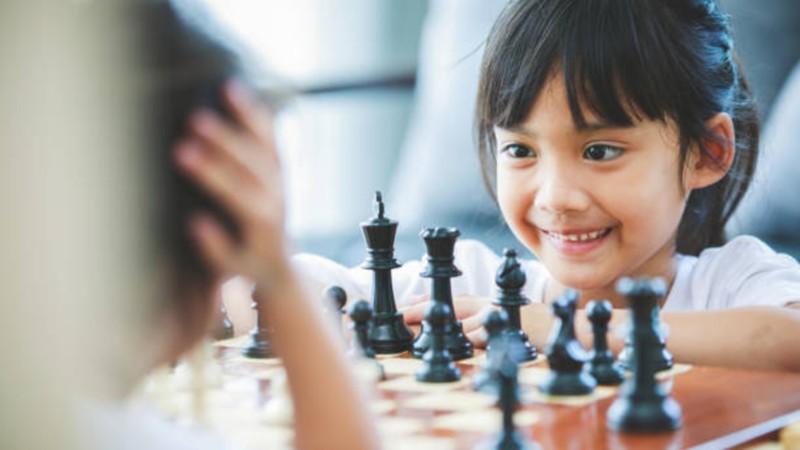In today’s fast-paced, high-pressure world, finding ways to combat anxiety and improve mental health is more important than ever. While mindfulness practices and physical exercise often take center stage in discussions about well-being, chess is an often-overlooked yet highly effective tool for promoting mental health. This centuries-old game of strategy and focus offers a unique way to alleviate stress, build emotional resilience, and cultivate a calmer, more focused mind.
In this article, we’ll explore how chess helps tackle anxiety and enhances overall mental well-being for players of all ages.
Chess as a Form of Mindfulness
Mindfulness is the practice of being fully present in the moment, and chess naturally cultivates this state of awareness. During a game, players must focus entirely on the board, analyzing moves, anticipating strategies, and weighing their decisions. This immersion in the task at hand helps quiet the mind, pushing aside worries and distractions.
Reducing Mental Clutter
The structured nature of chess provides a mental “anchor,” allowing players to concentrate on the game rather than spiraling into anxious thoughts. For many, chess becomes a sanctuary—a place to escape the pressures of daily life and focus on something constructive and engaging.
Fostering Flow State
Chess often induces a state of “flow,” where players are fully absorbed in the activity. This state of deep focus not only reduces stress but also boosts mood and satisfaction. Studies show that engaging in flow-inducing activities like chess can decrease levels of cortisol, the stress hormone, while increasing feelings of happiness and relaxation.
Building Emotional Resilience Through Chess
Anxiety often stems from a fear of failure or an inability to cope with uncertainty. Chess directly addresses these fears by teaching players how to manage setbacks, adapt to changing circumstances, and recover from mistakes.
Learning to Handle Defeat
In chess, losses are inevitable, especially for beginners. However, the game encourages players to view these losses as opportunities for growth. Analyzing past mistakes and improving upon them fosters a growth mindset, helping players build resilience and confidence in their ability to learn and adapt.
Embracing Uncertainty
Chess is a game of unknowns. While players can plan and strategize, they can never fully predict their opponent’s moves. Learning to accept and navigate this uncertainty trains the mind to stay calm and focused, even in unpredictable or stressful situations. This skill is invaluable for managing real-life anxiety, where uncertainty is a constant factor.
Developing Patience and Stress Management
One of the key benefits of chess is its ability to cultivate patience and teach stress management. Unlike fast-paced video games or high-adrenaline activities, chess requires players to slow down, think carefully, and approach problems methodically.
The Calm of Deliberate Thinking
Chess teaches players to pause, reflect, and consider all possible outcomes before making a move. This deliberate, thoughtful process can help reduce feelings of overwhelm and encourage a more measured approach to challenges. Over time, players internalize this calm mindset, applying it to other areas of life.
Stress Relief Through Focus
Concentrating on the chessboard can serve as a powerful stress reliever. By channeling mental energy into the game, players can temporarily distance themselves from external pressures, gaining clarity and perspective.
Chess and Social Connection
Loneliness and isolation are common contributors to anxiety, and chess offers a way to connect with others in a meaningful and engaging way. Whether played in person or online, chess fosters social interaction and builds a sense of community.
Strengthening Relationships
Playing chess with family members, friends, or classmates provides an opportunity for bonding and shared enjoyment. The collaborative nature of learning and improving together strengthens relationships and reduces feelings of isolation.
Global Chess Communities
Online platforms have made it easier than ever to find opponents, join tournaments, and connect with fellow enthusiasts. These communities provide not only opportunities to improve your game but also a sense of belonging and support.
Cognitive Benefits That Combat Anxiety
Anxiety often manifests as overthinking, rumination, or difficulty concentrating. Chess helps combat these tendencies by enhancing cognitive functions like focus, memory, and problem-solving.
Improved Focus and Concentration
Regularly playing chess trains the brain to focus on one task at a time, reducing the tendency to overthink or become distracted. This improved focus can alleviate anxiety, making it easier to stay present and productive.
Boosting Confidence Through Problem-Solving
Successfully navigating a challenging chess game builds confidence in one’s ability to solve problems and overcome obstacles. This sense of competence can counteract feelings of helplessness and boost self-esteem, reducing anxiety over time.
Using Chess as Part of a Mental Health Routine
Incorporating chess into a daily or weekly routine can provide lasting mental health benefits. Here are some practical tips for using chess to promote well-being:
- Play for Relaxation
Set aside time for casual games without worrying about the outcome. Focus on enjoying the process rather than the result. - Solve Chess Puzzles
Chess puzzles offer short, focused challenges that are both fun and mentally stimulating. These exercises can help you shift your focus away from stressors while improving your skills. - Join a Chess Club or Community
Connecting with others who share your interest in chess can provide emotional support and a sense of camaraderie. Many local and online chess clubs welcome players of all skill levels. - Teach Chess to Others
Sharing your knowledge with friends, family, or children can be a rewarding experience that strengthens relationships and reinforces your own understanding of the game.
Conclusion: Checkmate Your Anxiety
Chess is more than a game—it’s a powerful tool for managing anxiety and improving mental well-being. By fostering mindfulness, resilience, patience, and social connection, chess helps players develop the skills needed to navigate life’s challenges with calm and confidence. Whether you’re seeking a new hobby, a way to de-stress, or a method for building emotional strength, chess offers a timeless and accessible solution.
So, why not pick up a chessboard and make your first move toward a calmer, more focused mind? With each game, you’ll be taking steps not just to improve your skills, but also to enhance your mental health and overall quality of life.

